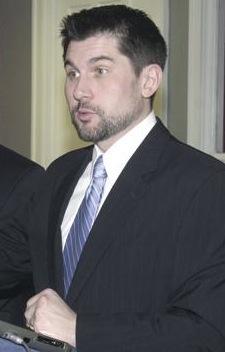
The Cuomo Administration's transportation policy is still taking shape, but here's a name to watch: Jim Malatras. As Cuomo's new deputy secretary for policy management, Malatras will be a top advisor on all major transportation decisions, including how transit riders fare in the upcoming budget.
"The Cuomo administration's point man on MTA policy issues is Jim Malatras," said John Kaehny of the watchdog group Reinvent Albany. Kaehny noted that Malatras will be overseeing a broad portfolio of policy issues. "Traditionally, the deputy secretary for authorities is responsible for day to day operational and budget discussions with the MTA and other state authorities," added Kaehny. "That person hasn't been appointed yet."
Until that position is filled, Malatras will be the key advisor on MTA issues. Critical decisions are already being made, especially regarding the budget, so Malatras is someone for transit advocates to keep an eye on for now.
Recently, Malatras has been part of the Cuomo team, most recently helping the Cuomo campaign develop its policy positions and before that serving as the executive director of legislative affairs and state policy for the attorney general's office.
When it comes to Malatras' bio, however, transit advocates are more interested in the job he held before working for Cuomo: legislative director for former Assembly Member Richard Brodsky.
"Some people might focus on Brodsky's opposition to congestion pricing," said the Straphangers' Campaign's Gene Russianoff. Malatras was still Brodsky's deputy in 2007, when the Westchester representative led the fight against congestion pricing.
While this could understandably give transit advocates cause for concern, Russianoff was more optimistic. "I'd focus on the fact that Brodsky provided tough oversight of authorities in general and the MTA specifically." He cited Brodsky's work to create the Authorities Budgeting Office and the hearings he held as chair of the authorities committee. In one such hearing, it came to light that former U.S. Senator Al D'Amato had earned $500,000 for a single phone call placed to the MTA chairman.
"You could have an administration that came in and saw the authorities as their patronage mills," said Russianoff. "That's why Pataki appointed [Peter] Kalikow and [Virgil] Conway," two MTA leaders who were also top campaign donors. Malatras, suggested Russianoff, would at least assess the MTA's needs seriously.
Whatever Malatras' influence turns out to be, Russianoff agreed he'll be at the center of upcoming debates. "He's pivotal."





